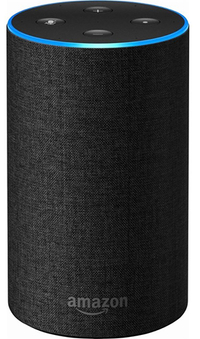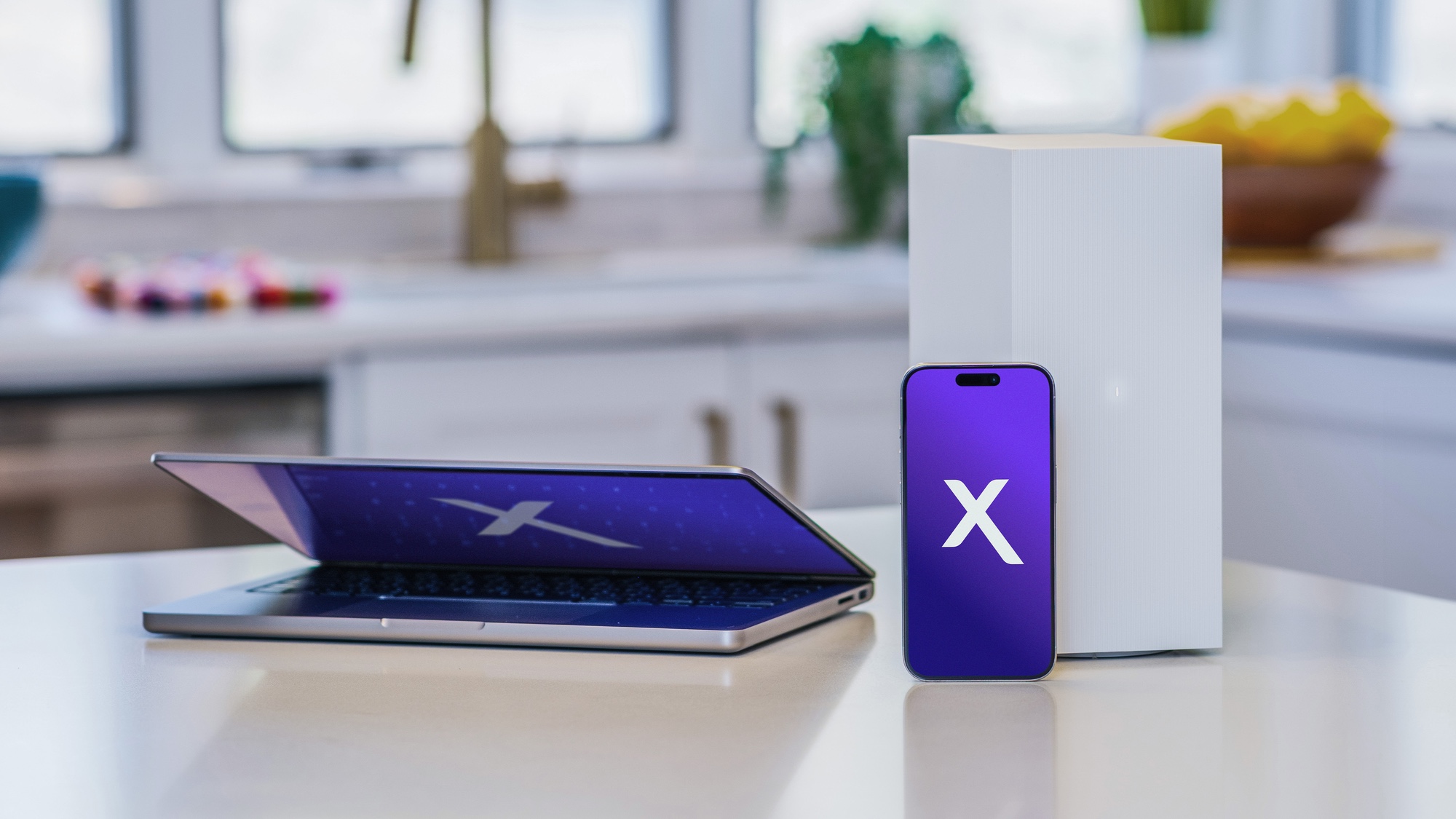At their core, both the Google Home and the Amazon Echo are Wi-Fi-connected speakers with a built-in voice assistant that can seemingly do everything from playing music to controlling your lights. But there are more than a few differences between these competing gadgets.
To see which comes out on top, we put both of these speakers and virtual assistants through 10 rounds of competition, ranging from design and smart-home features to overall intelligence and value. Google Home is good, but the Echo reigns supreme. Here’s why.
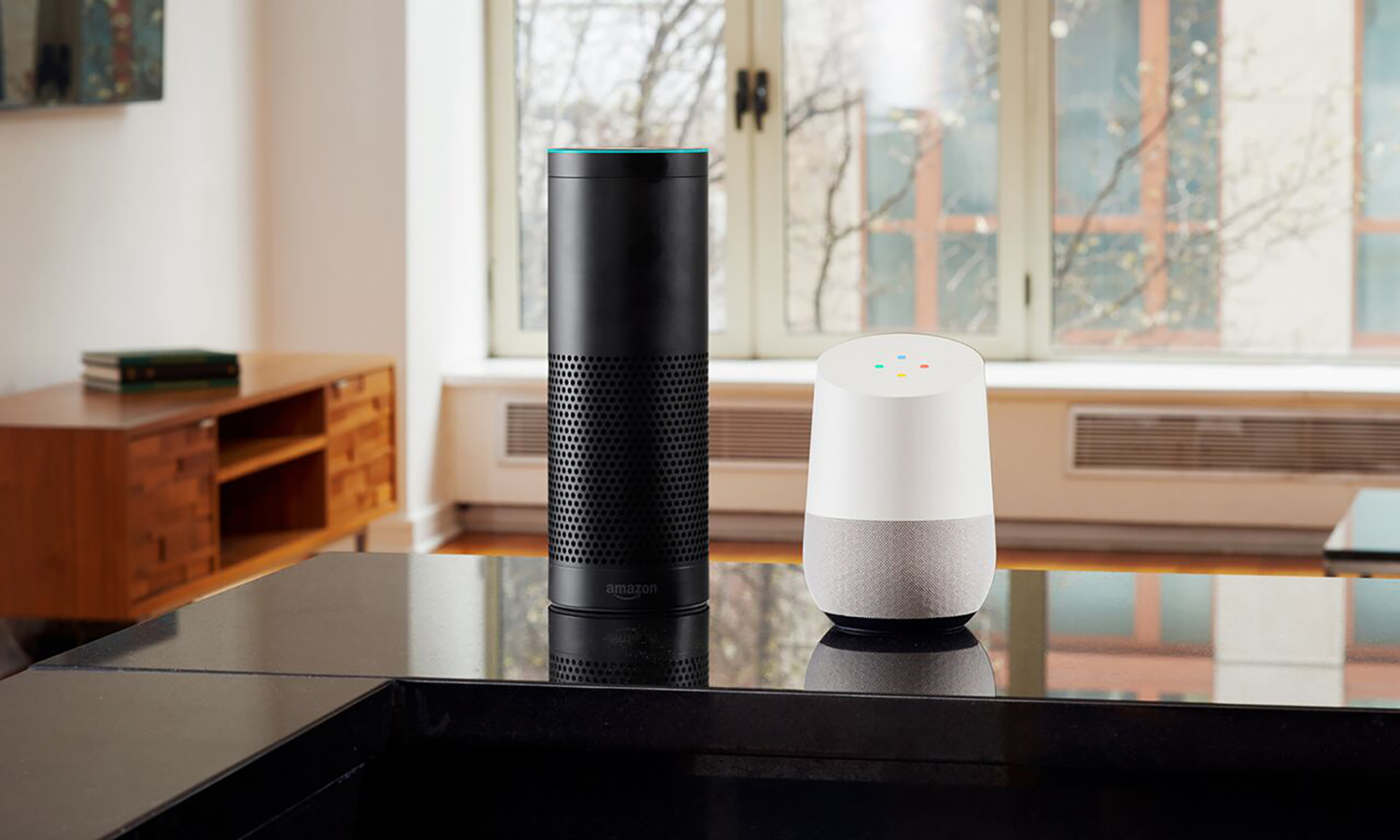
Design
The Echo has a fairly simple cylindrical design, whereas the Home has a more rounded base with a top that's cut off at an angle; it's reminiscent of a vase. The base of the Google Home comes in several colors (mango, marine, violet, carbon, snow and copper), which can be swapped out by the user — extra bases cost $20. The Echo is available in only black or white. Both come with buttons to let you mute the microphone, but the Google’s main interface is a touch-sensitive surface that you can tap or swipe, whereas the Echo uses a physical button and volume knob.
Winner: Google Home.
Not only does it have a better design, but you can customize its look, too.
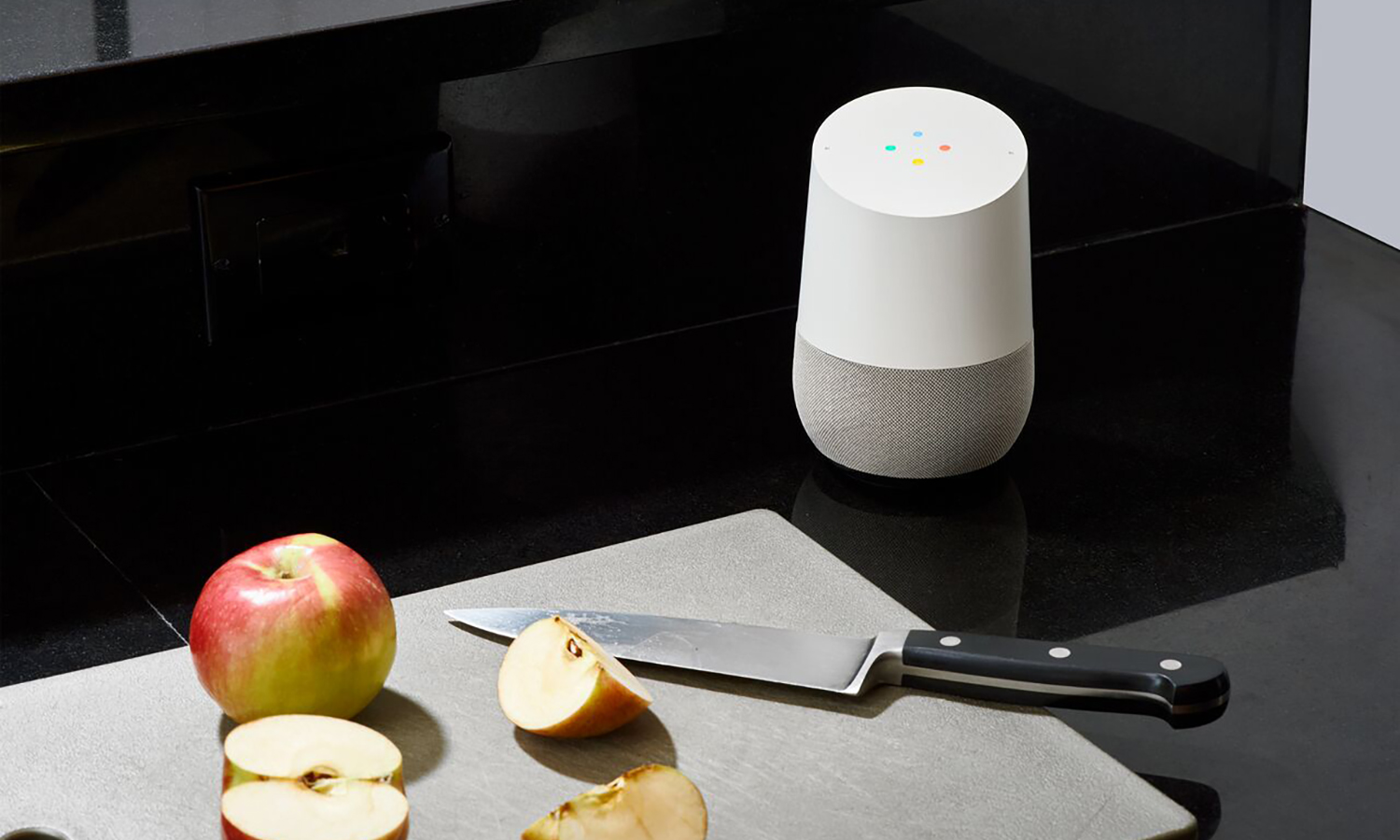
Smart-Home Features
One of the key features of both the Echo and Google Home is that they let you control a number of smart-home devices using just your voice. For instance, you can say, “Alexa, dim the lights,” and if you have it connected to, say, Philips Hue smart bulbs, Alexa will dim them for you. You can also have it turn lights on or off by the names you’ve assigned to the light or the room it’s in, or even change the color if you have compatible bulbs.
Both Amazon and Google are constantly adding new smart-home partnerships, so this round is a bit of a moving target. Currently, Google Home works with the Nest Learning Thermostat, the Samsung SmartThings Hub (which is a go-between device that itself is used to control even more smart-home devices like lights and smart plugs), Philips Hue lights, Honeywell thermostats, the Logitech Harmony smart remote control, Wink (another smart-home hub that interfaces with smart lights, thermostats and plugs), and the Anova Precision Cooker, a sous vide machine.
Still, by virtue of its being around longer, the Echo currently works with a much wider range of devices than the Home. Not only does it connect to everything listed above, but it also works with Insteon and Ecobee thermostats, a range of home appliances from LG and GE, a robot vacuum cleaner from Samsung, garage door openers, smart sprinklers and more. Another example: while Google Home only works with August smart locks, Alexa can communicate not only with them, but also smart locks from Schlage, Kwikset and Yale.
MORE: The Best Products That Work With Amazon Alexa
Winner: Amazon.
Alexa currently works with far more smart-home devices than Google Home, but the latter is catching up fast.
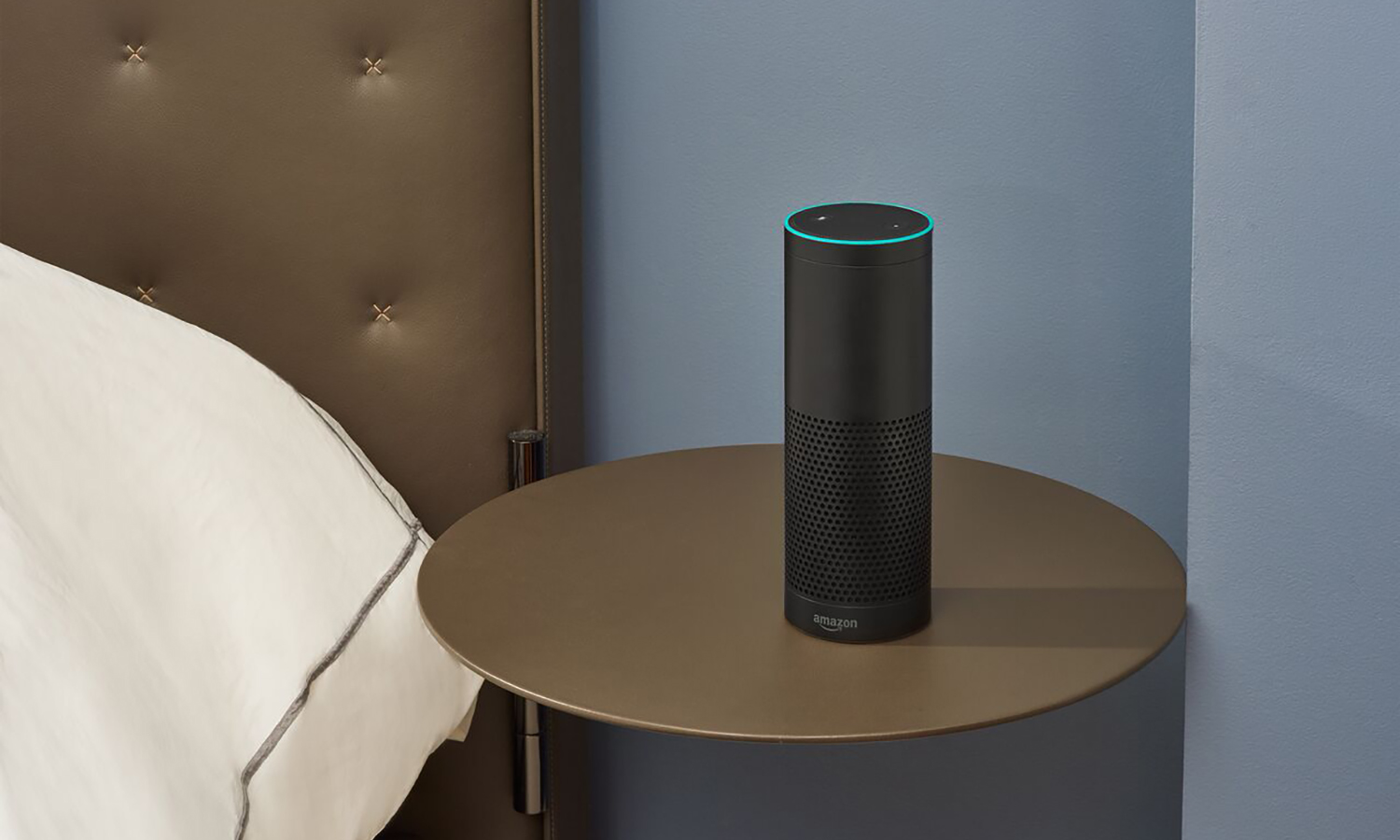
Voice Assistant
Both Alexa and Google Home will let you set up appointments, track packages, look up local movie times and so forth. Amazon’s assistant is boosted by “skills,” which will let you perform such tasks as ordering pizza from Dominos, call an Uber or Lyft, or even start a workout. These skills are voluminous, and more are constantly being added. At last count, there were more than 12,000 in 21 categories.
However, Google Home leverages Google's oldest feature, and one that Amazon can't offer: freeform search. You can use your voice to search for just about anything you would type into Google, and in many cases the Home will read aloud the best answer it can find. (A personal favorite: using it to ask how long certain foods stay fresh in the refrigerator.) Google Home also lets you look up the status of airline flights, which Alexa can’t do, and you can also ask the Home to remember things for you — like where you keep your passport — which it will recall for you later on.
MORE: 49 Best Amazon Alexa Skills
We asked Alexa and Google Home 11 questions across a range of topics to determine which would win this round.
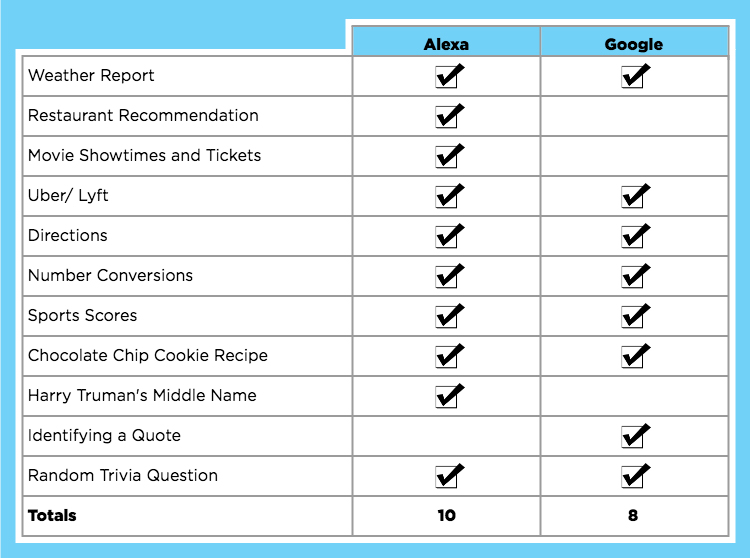
What’s the weather? Tie. Alexa and the Google Home both provide the current weather, as well as the forecast for the day, including high and low temperatures.
What’s a good Italian restaurant near me (and can you book a reservation)? Alexa. Both listed three restaurants, though Google Home also gave the street addresses. However, only Alexa will let you make reservations, though you’ll need to enable the OpenTable skill and link it to your account.
What time is Guardians of the Galaxy playing (and can you get tickets)? Alexa. Google Home will tell you where a movie is playing and some info about what’s playing at theaters near you, but it won’t give you showtimes and it can’t buy tickets. Alexa, on the other hand, will tell you what’s playing (in admittedly excruciating detail), let you list showtimes for local theaters, and, once you enable the Fandango skill and link your account, allow you to buy tickets. (Though it’s still probably easier to do so on your smartphone or computer.)
Can you get me an Uber/Lyft? Tie. Neither of the voice assistants integrates with Lyft, but either can get you an Uber if you link your account.
Give me directions to the Aquarium. Tie,with a slight edge to Google. Both Alexa and Google Home will suggest to you a fastest route and an estimated time of travel, but neither of them provides you with specific directions. However, Google Home will soon add the ability to send directions to your phone.
Convert 6.2 miles into meters. Tie. Unit conversions is low-hanging fruit for both voice assistants.
What was the score of the last Red Sox game? Tie(with a slight edge to Alexa). Both provided me with the score of the last baseball game the team had played, but Alexa also let me know about the next upcoming game.
Give me a recipe for chocolate chip cookies. Tie. Both found a recipe from All Recipes — the same one, in fact — and allowed you to go through step-by-step. Alexa requires you to enable the All Recipes skill in order to get the recipe, but it also offers more options, such as asking interactive questions about the recipe.
What is Harry Truman’s middle name? Alexa. Google Home completely failed on this question, whereas Alexa correctly pointed out that Truman’s middle initial, “S”, doesn’t stand for anything.
Who said “the only thing we have to fear is fear itself”? Google Home. One-up to Google for correctly identifying this quote.
How deep is the Mariana Trench? Tie. Google gave more context about it, but Alexa gave the depth in both feet and meters.
Winner: Amazon.
While both voice assistants let you do things the other can’t, Amazon’s won more categories in our test.
Music and Movie Playback
Both Alexa and Google Home will natively let you stream music from Pandora, Spotify, TuneIn and iHeartRadio. For Prime members with an Echo, you can also stream from Amazon Music, while Google Home users can listen to audio from Google Play Music and YouTube Music. Amazon’s speaker can also read aloud audiobooks from Audible, as well as compatible Kindle books. And because the Echo has Bluetooth, you can use it as a Bluetooth speaker and stream audio from your phone or tablet. (The Echo Dot can also output audio *to* a Bluetooth speaker.)
Google Home will also let you stream music and movies to either the speaker itself, or to other speakers in your house that are connected to a Chromecast Audio device. This works with both Android and iOS devices, and lets you stream audio throughout your house, or to selected speakers. You’ll also soon be able to stream music from an Android or iOS app to Google Home.
If you have a Chromecast connected to your TV (or a Chromecast-enabled TV, such as those from Vizio), you'll also be able to use Google Home to search and play videos using your voice; currently, it works only with YouTube and Netflix, but HBO support is coming. Additionally, Chromecast is being updated to show visual responses from Google Home commands, so you’ll be able to see a list on TV of shows on YouTube Live, for instance. To get a similar feature with Alexa, you’ll need to get the forthcoming Echo Show, which features a 7-inch touch screen, or the Amazon Fire TV Edition.
Winner: Google.
The ability to stream not just music, but movies to other speakers and TVs, is a killer feature. However, you also need a Chromecast-enabled device for this to work.
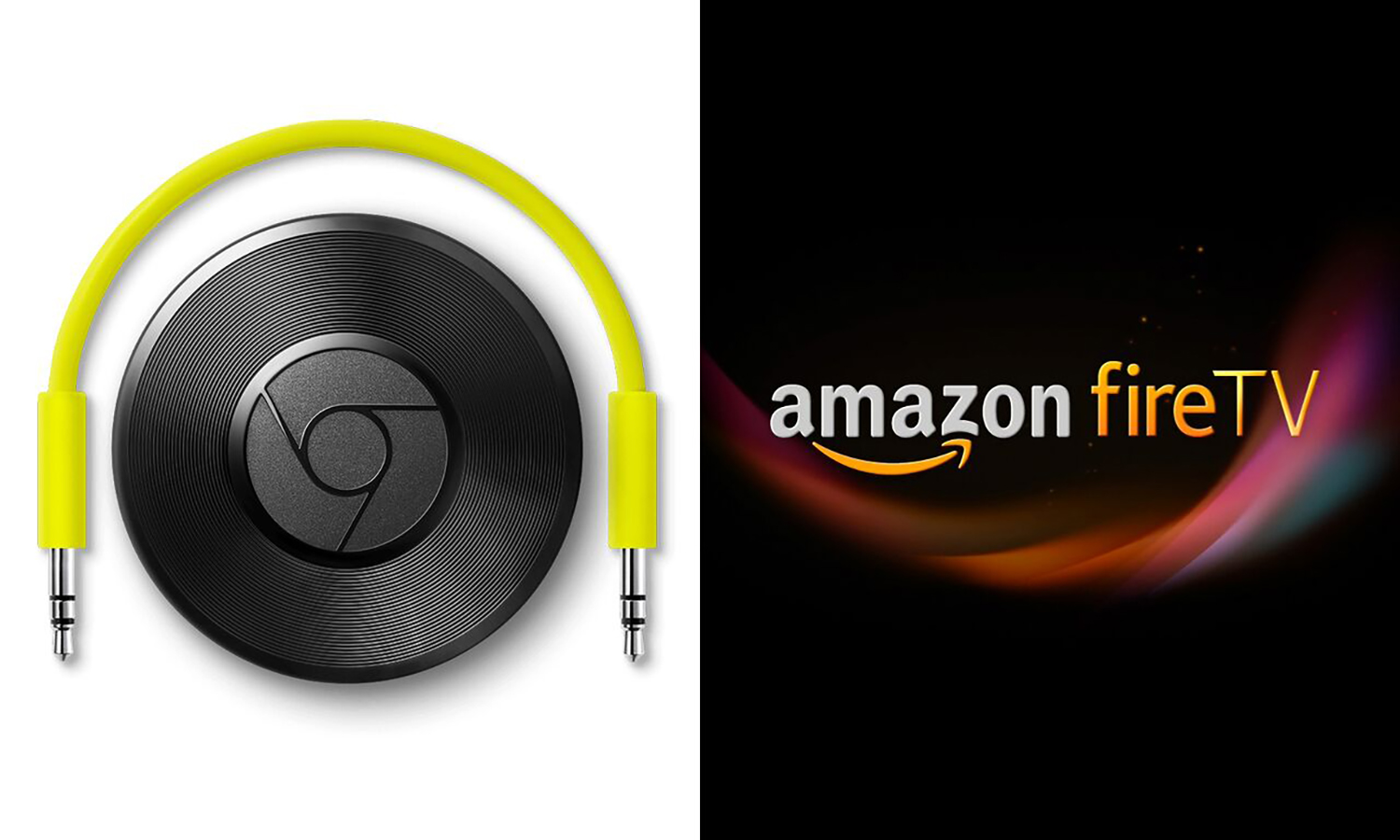
Shopping
Not surprisingly, the Echo lets you order many things off of Amazon, though it’s limited to two categories of things: physical goods that are eligible for Amazon Prime and digital music. (That still covers a fair number of things.) You can also reorder things that you’ve bought in the past, ask Alexa for Amazon deals, and add things to your shopping cart or Alexa shopping list for purchase later. There are a few additional caveats: you need to be a member of Amazon Prime (even a 30-day free trial will work), and you need to be in the U.S. with a U.S. payment method.
Google Home also lets you order things online via Google Express, which, while not nearly as extensive as Amazon, does connect to a number of major retailers, including Target, Walgreens, Kohls, Costco and Staples. Here is a full list of retailers, though availability depends on your location and, even then, not all products at those stores are available to purchase via Google Express. For example, you can only buy things between $4 and $100 currently. Also, unlike the Echo, there appears to be no way to set a voice code for confirming purchases.
Winner: Amazon.
You can order more things with Alexa than you can with Google Home, and the experience is definitely more seamless.
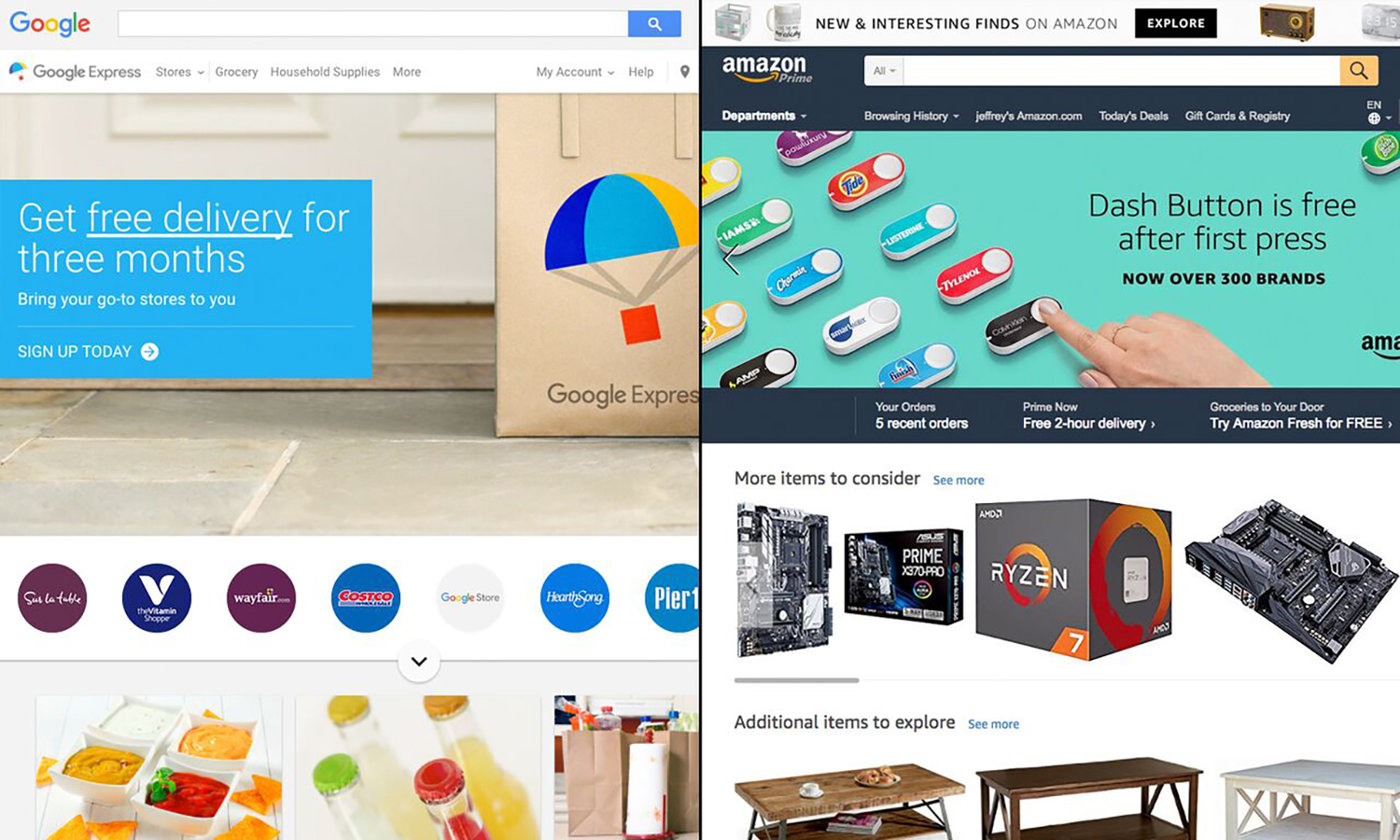
News, Weather & Sports
Both Amazon and Google can provide local weather forecasts as well as news reports from specific outlets, such as CNN or the BBC. Also, both services will give you the scores and schedules of specific teams. However, only Alexa lets you set your favorite teams, so you can get updates without having to specifically ask for each by name.
Winner: Amazon.
Being able to set your favorite sports teams gives Amazon the edge.
Games and Entertainment
Want to play a game? Google Home has Mad Libs, the Name Game, Crystal Ball and a few other amusements. Sadly, it pales in comparison to all of the humor, trivia and Easter egg skills you get with Alexa. You can even try your hand at Jeopardy questions, playing a dungeon-based adventure, or even solving the crime of who killed Bruce Wayne’s parents. Try getting Google Home to meow to your cats.
Winner: Amazon.
All of Alexa’s third-party skills make this round no contest.
Personalization
If you have more than one person living under your roof, an in-home assistant is much more useful if it knows who’s speaking to it.
Google Home can recognize different individuals by voice, and tailors its responses accordingly. It’s also adding support for proactive assistance, so it can automatically notify you of upcoming events. For example, it can look at your calendar, and tell you if you need to leave early for an appointment if there’s a lot of traffic. It will also be able to bring up personalized recommendations for movies and music, too.
Amazon’s assistant can’t distinguish between different individuals, but the company is working on rolling out notifications that will also be able to proactively notify you of certain developments, rather than waiting for you to ask.
Winner: Google Home.
Being able to receive personalized responses, especially in households with multiple individuals, is very helpful indeed.
Productivity
Voice assistants should do more than just keep you amused, but how well do Google Home and Alexa fare when it comes to productivity?
Both Alexa and Google Home can create shopping lists, set timers and alarms, add events to your calendar — while Home naturally uses Google Calendar, the Echo supports not only that but also Outlook.com and Office 365 — and read events from it. Both services can also calculate conversions, such as from cups to liters.
Google Home takes advantage of Google Translate to figure out how to say anything in more than 90 languages. That’s much better than Alexa, which has some translation skills, but nowhere near Google Home’s depth. On the other hand, Alexa’s skills encompass a wider range of productivity tools, such as recipes, stock quotes, locking and unlocking certain cars, even finding your phone and guiding you through a workout.
Update (10/4): Both the Echo and Google Home will let you make phone calls to any number in the U.S. and Canada. You can also use the Echo as an intercom to talk to other Alexa-enabled devices using its Drop-In feature.
Winner: Amazon.
It’s a close one based on all the things that Google search can provide, but once again, the plethora of third-party skills gives Amazon the edge.
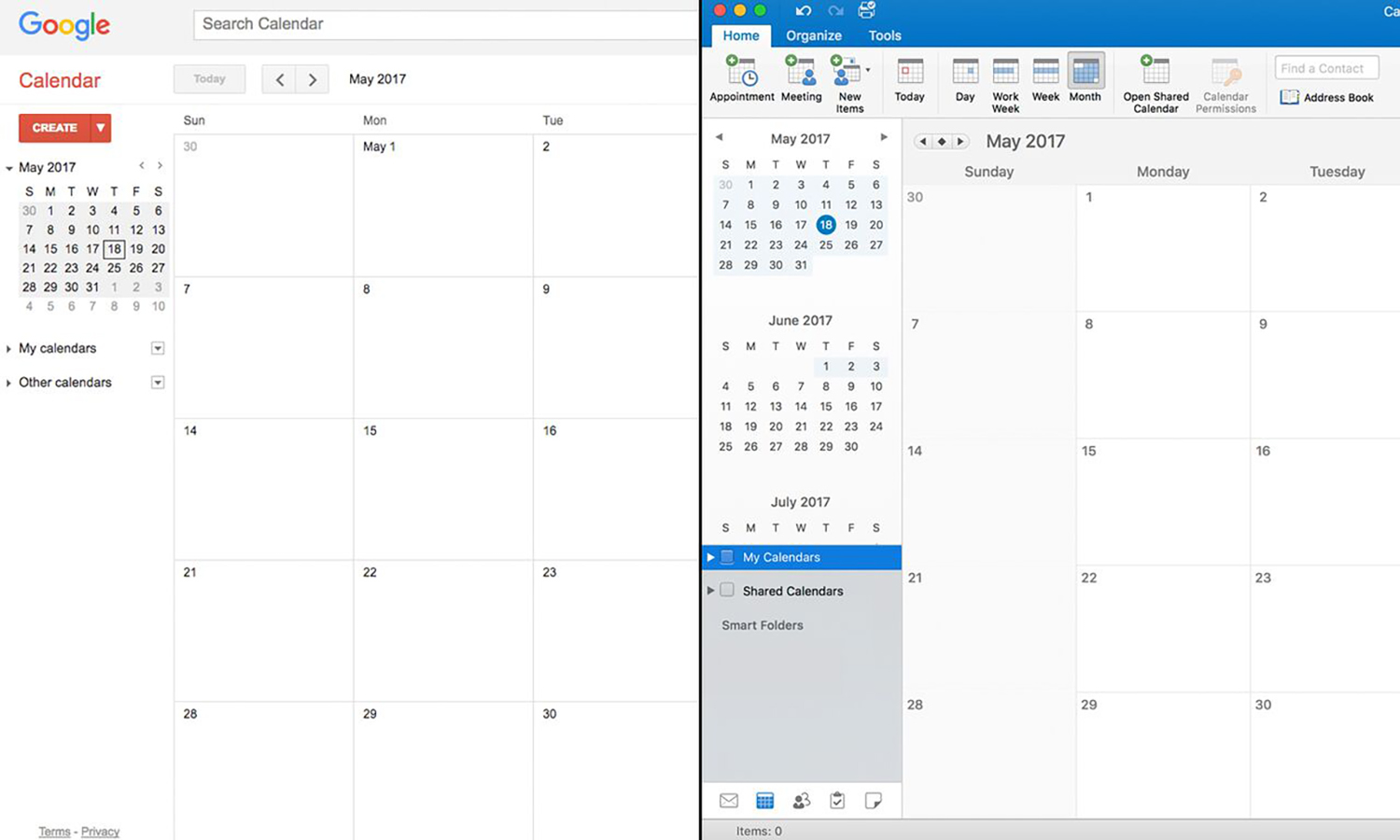
Price and Value
The Amazon Echo costs $179 (although it's being discontinued; the second-gen Echo will cost just $99), while the Google Home costs $129. No contest there, but Amazon has a suite of other Alexa-enabled devices, including the Echo Dot ($49), the Tap ($129), the Echo Show, and coming soon, several other devices; not to mention there are several third-party speakers (such as the $49 Fabriq) that also come with Amazon’s voice assistant.
MORE: Amazon Alexa Buying Guide: Which Is Best For You?
Winner: Tie.
Google Home costs less than the Echo, but Amazon offers more options for getting Alexa into your home.
Bottom Line
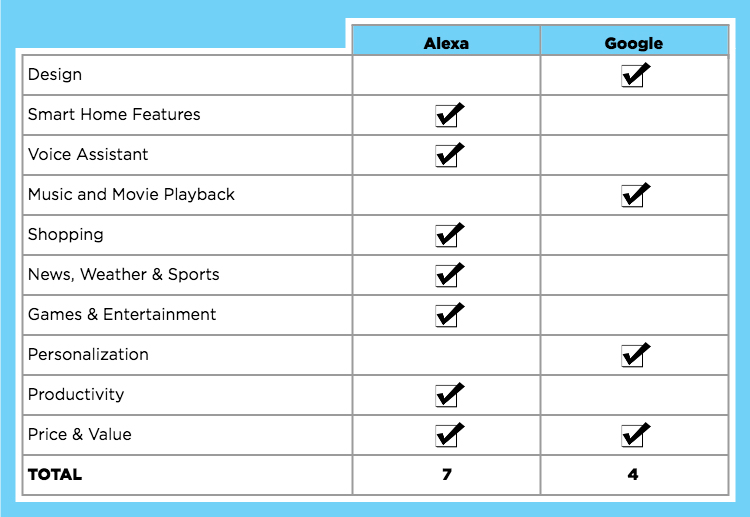
While Google Home’s design and movie-playback features best the Amazon Echo, ultimately, Amazon’s voice assistant handily wins this match-up by letting you control a larger number of smart-home devices and providing a lot more skills in multiple categories. And, if you find the Echo too pricey, you can get Amazon’s assistant in a variety of other devices. However, with support for multiple users and hands-free calling to any number, Google Home is gaining ground; we’ll be revisiting this showdown as new features appear.
Sign up to get the BEST of Tom's Guide direct to your inbox.
Get instant access to breaking news, the hottest reviews, great deals and helpful tips.
Dan Moren is the author of multiple sci-fi books including The Caledonian Gamibt and The Aleph Extraction. He's also a long-time Mac writer, having worked for Macworld and contributed to the Six Colors blog, where he writes about all things Apple. His work has also appeared in Popular Science, Fast Company, and more
